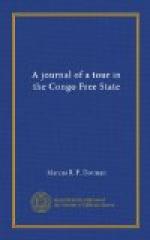Next morning it was still raining hard, so we waited in the dry without anxiety, as we knew the journey to Yakoma would only take five or six hours, but about 10 a.m. having emptied the canoes, which were full of water, we arranged the baggage and made a start. Village succeeded village, in which were numerous people elaborately decorated with beads and paint, but not otherwise covered. All the Chiefs were well disposed and presented eggs or chicken, and took the cloth or salt offered in return without grumbling. About midday we reached the commencement of the Yakoma village, which extends for some miles along the bank. Most of the crew were evidently well known here and several lived in the village. Their well-meaning friends therefore, jumped on to the canoes as they passed or swam out to them and took the paddles and poles from their tired comrades. With a greatly augmented company, with the canoes dangerously deep in the water, with tom-toms beating, bells ringing, bugles sounding and people shouting, we arrived at Yakoma about 5 p.m. on October 15th thus completing a voyage along the whole length of the Ubangi river.
CHAPTER VII.
Yakoma to Djabir.
Yakoma is built on the banks of the Uele just before it joins with the Bomu to form the Ubangi. The voyage up that river from its entrance into the Congo to its source here occupied seven weeks of which half the time, however, was spent in State Posts. Canoe travelling is terribly tiring, although one merely sits still in a hammock chair all day, and it has not been by any means comfortable camping in the forest during or after the daily tornado. Still the trip has been very interesting for this is one of the least known parts of the world and the people are probably the least civilised.
This experience brought home the fact with something like a shock that human nature is much the same everywhere and that if the savage leads the life practically of an animal, he is at the same time not very much unlike modern civilised man. He does not wear clothes, but he is very vain and adorns himself with beads and bangles, his hair dressing requiring hours of patient labour. He is often as pleased at being photographed as a young fashionable beauty and, if a warrior, is as proud of the paint which shows he has killed some one in battle, as a soldier is of his medals. He is frankly commercial in his dealings and as anxious to say what he thinks will please his guest as the most tactful of society’s hostesses. He is as keen to win in a canoe race as any undergrad in his college boat and is a genuine and true sportsman. He is very jealous as a husband and devoted as a father, characteristics common both to animals and to the most intellectual of men. He is, as a Chief, by no means hard on his subjects although his punishments are barbarous and his sense of justice not greatly developed. He eats human flesh but not the diseased




